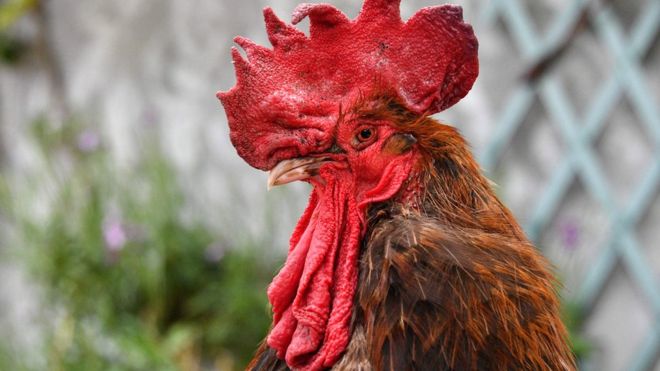
Maurice himself was not present for the proceedings in the western town of Rochefort, and nor were his accusers, a retired couple with a holiday home on the picturesque island who claim his dawn chorus rouses them from their slumber.
But feathered fans of the celebrity cockerel were on parade outside the courthouse, among them a chicken called Pompadour and giant Brahma rooster called Jean-Rene.
The case has attracted attention not only because the rooster is one of France's national emblems, but because the complaint is seen by some as an attack on the countryside's traditional sounds and way-of-life.
The couple's lawyer, however, rejected the characterisation of the case as a battle between "bobos" - bourgeois bohemians - and countryfolk.
"My clients live in a housing estate. It's not the countryside," Vincent Huberdeau argued.
Maurice's owner, Corinne Fesseau, who has been living on Oleron island for 35 years, told French radio she had taken to locking up her bird at night and lined his shed with egg boxes to try to block the light and so stop him crowing - but all to no avail.
"Out of 40 neighbours there are only two who are bothered by it!" her lawyer Julien Papineau told the court.
Fesseau defended the cockerel's right to make himself heard. "He crows and I think it's great. Long live nature!" she said.
Tensions between locals and holiday-home owners are nothing new in rural France, but Maurice's case has become something of a cause celebre.
"Today it's the cockerel, but what will it be tomorrow? Seagulls? The noise of the wind? Our accents?" said Christophe Sueur, mayor of Saint-Pierre-d'Oleron where Maurice and his owner live, in comments to AFP last month.
The growing wealth gap between rural and urban France has been at the heart of weekly "yellow vest" demonstrations which began in November last year.
Maurice, who has his own Facebook page, appeared in a luminous yellow vest in one post in November expressing solidarity with the protesters.
The trial has raised tempers, with the mayor of Gajac village penning a furious open letter in May in defence of the rights of church bells to ring, cows to moo, and donkeys to bray throughout rural France.
"When I go into town, I don't ask them to remove the traffic lights and cars," mayor Bruno Dionis du Sejour, who is a retired farmer, told AFP.
Those newly arrived from the city who complained about noise or smells, he wrote, were like "fools who discover that eggs don't grow on trees".
Dionis du Sejour has asked the French government to classify the sounds of rural France as part of the country's heritage.
That could lead to it being protected as "intangible" world culture on a list kept by the UN's cultural agency, UNESCO.



1732503274-0/Untitled-design-(43)1732503274-0-165x106.webp)
1732501636-0/Untitled-design-(42)1732501636-0-165x106.webp)












COMMENTS
Comments are moderated and generally will be posted if they are on-topic and not abusive.
For more information, please see our Comments FAQ